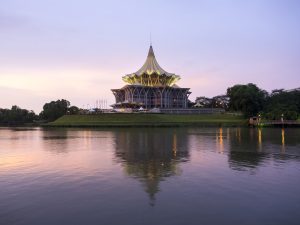This Saturday, residents of the eastern Malaysian region of Sarawak will vote in state elections that could play into the uncertain political situation at the federal level. Early voting for the election is already well under way, as a total of 349 candidates compete to win the 82 seats in the Sarawak State assembly, Malaysia’s oldest and largest state legislature.
The poll will pit the ruling Gabungan Parti Sarawak (GPS) coalition, which holds 67 of the 82 seats in the assembly, against a characteristically crowded nest of challengers. These include the pro-Sarawakian independence Parti Bumi Kenyalang (PBK), Parti Sarawak Baru (PSB), and parties belonging to the opposition Pakatan Harapan (PH) coalition, in addition to some 30 dark-horse independents.
Most notably, this will be the first state election that GPS has contested under its own banner. Formerly a part of the federal Barisan Nasional (BN), the four parties of GPS saw the writing on the wall after BN’s historic electoral defeat in 2018 and rebranded themselves as an independent regional coalition.
Under its new moniker, GPS has sought to distance itself from the racial divisions and political dysfunction of federal politics, and is offering voters a “Sarawak First” message that emphasizes the region’s own multiethnic identity.
GPS Chief Minister Abang Johari Tun Openg said in early 2019 that the coalition bailed out of BN so that it could stand “on our own feet” and promised to “speak with boldness and without fear when we talk with Kuala Lumpur regarding our rights under the Malaysia Agreement 1963.” This agreement, commonly known as MA63, is the agreement under which Sarawak, North Borneo (today’s Sabah), Singapore, and Malaya came together to form the Malaysian Federation. (Singapore was ejected and became independent in 1965.)
A resounding victory for GPS, which currently holds 72 of the 82 seats in the state assembly, could act as a bellwether of how the state might vote at the next general election, which is scheduled to be held on or before July 2023. Sarawak is allotted 31 seats in the 222-seat lower house of the Malaysian Parliament, the most of any state,
It could amplify further the longstanding calls for regional autonomy, if not outright independence, for the states of eastern Malaysia. As James Chin of the University of Tasmania explained in a recent interview with The Diplomat, the past decade has seen increasing calls to revisit MA63, whose promises of a high degree of autonomy to Sabah and Sarawak have gone largely unfulfilled.
This increasing pressure for autonomy has been accompanied by the spread of pro-autonomy messaging and regional identity politics on social media, and also by the growing awareness of the political weight enjoyed by Sabah and Sarawak. Support of MPs from these two states were the only thing that stood between the BN coalition and defeat at the 2008 general election and the support of GPS, which currently holds 18 of Sarawak’s seats in the lower house, has been crucial to the formation of the last two federal governments.
For this reason alone, Prime Minister Ismail Sabri Yaakob, who has his eye on the next general election, is unlikely to do much to push back against prospective calls for increased autonomy. Indeed, on Tuesday, the lower house passed a bill amending the country’s Constitution to make good the promises of autonomy contained in MA63, and elevate the status of Sabah and Sarawak within the federation.
Earlier this month, in an article for Asialink, Chin described the election as “a referendum on GPS’s political moves to create a ‘state within a state’” in Sarawak. “GPS wants Sarawak to be distinctly different from the rest of Malaysia. It has the political capital to do this, and it has been doing this for a while,” he wrote. “Now all it needs is a clear endorsement from Sarawak voters on 18 December, so that they can take this to the next level.”

































